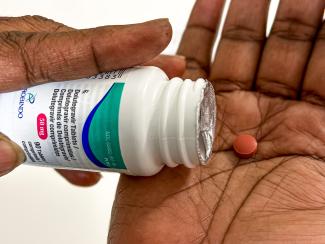People living with HIV/AIDS (PLHIV) rely on regular access to medication (known as antiretrovirals) to keep the HIV virus in their blood under control.
In Angola, the Ministry of Health's National Institute in the Fight against AIDS (INLS) works hard to ensure that there is enough HIV medication in health facilities where people living with HIV receive treatment.
Despite these efforts, the Angola national HIV program faces critical funding shortages, which makes it challenging to provide quality care and treatment for people living with HIV. There have been times when health facilities had limited or incomplete supplies of medication, leading to shortages. Additionally, medication stored in central and provincial warehouses has not always been delivered to health facilities on time, resulting in patients’ treatment delays.
To support and promote an efficient HIV response, in the implementation plan for 2024 - 2025, the PEPFAR Angola program has provided additional $10 million to support four provinces namely, Benguela, Cunene, Huambo and Lunda Sul. This funding was aimed at enhancing commodity security for ARVs and provision of uninterrupted HIV treatment services in the 22 PEPFAR-supported health facilities.
The funding led to significant improvements in Angola's HIV response. PEPFAR Angola expanded its program by procuring over 1 million bottles of HIV medication increasing medicines safety from 27 to 43 percent and treatment coverage, across the 22 PEPFAR-supported health facilities, from 66 percent in 2019 to 102.6 percent in 2024, enabling more PLHIV to initiate life-saving ARV therapy.
This expansion has also allowed more new patients to start treatment, with a total of 24,847 children and adults now receiving care in both civilian and military populations. The program has successfully provided life-saving HIV treatments to more Angolans by making it easier for patients to get their medication at health centers. For instance, 10,255 patients can now receive a six-month supply of treatment in one visit.
PEPFAR Angola's investment has eliminated medication shortages in the 22 supported health facilities, helping to close the treatment gap and significantly improving the lives of Angolans living with HIV. This also supports PEPFAR's goal of ending the HIV/AIDS epidemic as a public health threat by 2030.
Given the impact an increase in funding has had in the PEPFAR Angola program, the INLS has begun pushing for more funding from the Ministry of Finance to increase the national HIV budget, expand access to treatment, and implement a patient-focused care model.
PEPFAR will continue to work closely with the Angolan Government, the Ministry of Health (INLS), and the Global Fund to ensure a steady supply of HIV medication and provide comprehensive HIV prevention, care, and treatment services in support of the national HIV response.

USAID Angola
